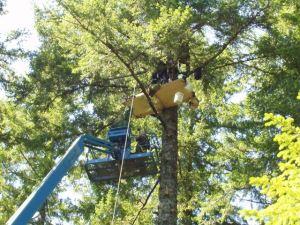from KVAL.com
A tree farmer serving in the Legislature wants to put tougher penalties on people who chain themselves to equipment and block roads to stop logging on state forests.
“There’s been a 30-year reign of terror by these people having no respect for the rights of others,” Rep. Wayne Krieger, R-Gold Beach, said Friday. “If they want to do civil disobedience, they can do that. It’s part of the Oregon Constitution, and the federal. But when they go beyond that and start chaining themselves to trees, locking themselves to equipment, and laying down in the road, and in any way they impede access, then they have gone over the line.”
His bill (HB 2995) would create a new felony charge of interference with state forestland management, punishable by up to five years in prison and a $25,000 fine. A companion bill (HB 2596) would allow loggers to sue protesters for lost income plus $10,000 up to six years after a protest.
House Judiciary Committee Chairman Jeff Barker, D-Aloha, said the criminal charge bill won’t pass out of committee until it is rewritten to overcome constitutional problems with impairing people’s right to protest.
“There seem to be some pretty clear constitutional violations in it,” Barker said. “I asked him to try to rework that to make some sense out of it.”
Barker added that as written, the bill may also violate the rights of unions to picket on a state road used by loggers.

Since the 2011 protests, a judge has blocked logging in Elliott stands occupied by the marbled murrelet — a threatened sea bird that nests in old growth forests — while a challenge from conservation groups moves through court.
Grace Pettygrove of Eugene, who was fined a couple hundred dollars on a misdemeanor charge of trespassing from the Elliott protests, said people would not be deterred by increased penalties.
“I don’t think that is what the criminal justice system is for, to punish people for standing up for what they believe in, especially when they are standing up for ecosystems in danger on public land,” she said. “The fact that this is happening actually shows that these timber corporations are worried about the impact public awareness and public protest will have on their operations.”
The Associated Oregon Loggers testified in favor of both bills.
“The contractors who get damaged by these kinds of activities are small family owned businesses that employ eight to 10 people,” said associated President Jim Geisinger. “If they think they will bring Wall Street to their knees by hindering a small business to conduct their affairs, they are wrong.”
Jason Gonzales of Friends of Oregon’s Forests said the companion bill allowing loggers to sue protesters for damages was a further attempt to intimidate people. He said loggers already had the right to sue for damages, but such lawsuits had not had much success in court.

